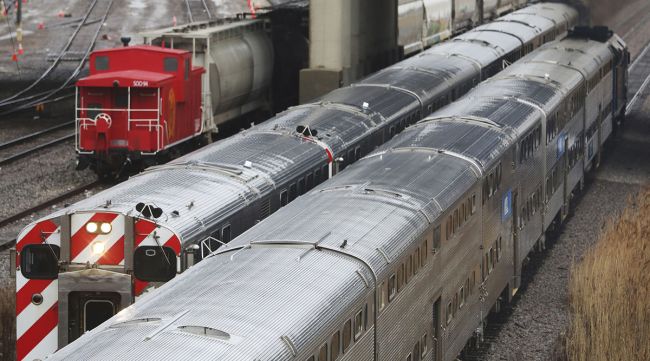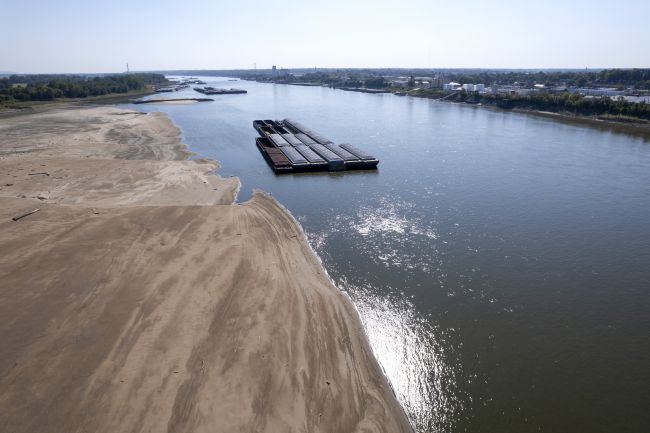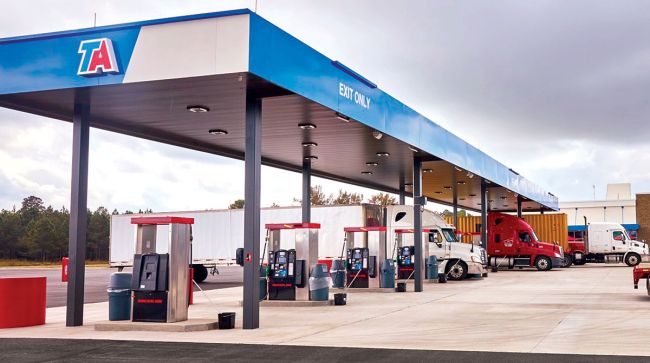Inbound and outbound Metra trains pass on the Metra Milwaukee District West Line at the Canadian Pacific Bensenville intermodal in Franklin Park, Illinois. (John J. Kim/Chicago Tribune/TNS)
A group of suburban Chicago communities is appealing the recent federal approval of a major rail merger that is expected to bring more freight trains to parts of the area.
In the appeal, filed May 11 in the 7th U.S. Circuit Court of Appeals, the group of nine communities argued federal regulators’ decision to approve the $31 billion merger of the Canadian Pacific and Kansas City Southern railroads was “arbitrary, capricious, an abuse of discretion, and otherwise not in accordance with law or supported by substantial evidence,” and violated several federal laws.
The group, known as the Coalition to Stop CPKC, wants federal regulators to conduct an additional study on the potential environmental impacts of the merger in the Chicago area. The group also wants more robust measures to combat the effects of the merger than were initially imposed.
“The (Surface Transportation Board) ruling shows us three things,” Itasca Mayor Jeff Pruyn said in a statement. “It ignored our concerns for the quality of life in our communities, it ignored our concerns about the negative consequences on economic development in our communities, and most importantly, it ignored our concerns for safety.”
Surface Transportation Board spokesman Michael Booth declined to comment because the litigation is pending.
The appeal follows the March 15 approval of the merger. The deal would create the first rail line linking Canada, the U.S. and Mexico, with far-reaching implications for local communities, Amtrak passenger rail and shippers looking to move goods through the country and across borders.
In the Chicago area, already a busy freight hub, the effects of the merger are expected to be felt along Metra’s Milwaukee District West Line, which shares tracks with Canadian Pacific. The number of freight trains along the line is projected to increase by about eight per day, bringing the total number to an average of just over 11 daily freight trains by 2027.

Chad Crotty of DDC FPO Solutions discusses how fleets handle outsourced business services. Tune in above or by going to RoadSigns.ttnews.com.
The outcome of the lengthy federal review process came weeks after a fiery Norfolk Southern train derailment in Ohio led to evacuations and fears of air and water contamination when toxic chemicals were released and burned.
It was lambasted by Metra, suburban towns and Illinois members of Congress, who disputed train data reviewed by the STB and expressed concerns about the effects of additional trains. Extra freight trains could increase delays for Metra commuter trains and drivers, exacerbate safety issues and pose problems for first responders who find their paths blocked by trains at road crossings, they said.
Union Pacific already filed an appeal of the decision in the U.S. Court of Appeals for the D.C. Circuit on May 3. Railroad executives said in a statement that the merger “is likely to reduce competition and negatively impact shippers and stakeholders. In approving the merger, the Surface Transportation Board acknowledged these concerns but did not adopt solutions to remedy the harms.”
Leaders of the coalition of suburban communities, which includes Elgin, DuPage County, Schaumburg and others, said federal regulators’ decision was flawed. The Surface Transportation Board “fell short of taking the requisite ‘hard look’ at impacts in the Chicagoland area,” which is required by law, they said.
“We’ve seen the news stories related to derailments and the negative impacts that long trains can pose in heavily populated areas,” Schaumburg Village President Tom Dailly said in a statement. “I believe the quality-of-life issues and safety impacts deserve more careful scrutiny, if not by the STB, then by the court system based on the very significant impacts this merger will pose not only to Schaumburg but to many neighboring communities in the area.”





